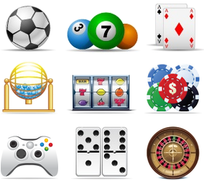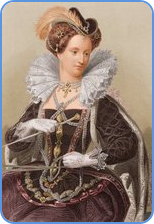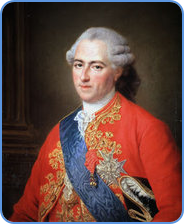 |
History of Lottery |
|
The first traces of lottery games dates back to the ancient China's Han Dynasty around 200 B.C., when ancient version of Keno slips were introduced.
Probably, the word lottery was derived from the word lot, which meant a stone, bone or other small object, used to determine the outcome of a chance event. The result of various events based on chance was then considered an indication of the Gods will and helped people to make a decision acceptable by everybody in society. On the right picture: Player of Canadian 6/49 Lotto chooses his lucky numbers. |
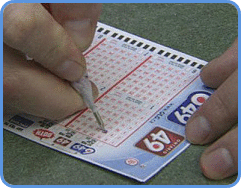
|
The "lots" as the way to find out the God's choice were very popular in ancient Judea and, in fact, the first King of Israel was chosen by lot. Amazing!. Many ancient Roman emperors including Octavian and Nero used lots during their parties to give away pieces of lands and gifts to the Roman local aristocracy.
Lotteries in mediaeval Europe
Some say that European history of lottery dates back to 1400s. That was the time when various towns tried to raise the needed money to improve the defense infrastructure. The lottery became an important form of gambling and the method to collect money for public projects and needs in many European towns and countries.
|
It seems that the European lottery history started in 1400s in France, when towns tried to raise money to fortify defenses.
The widow of the great Flemish painter Jan van Eyck promoted the first lottery at Bruges city in 1446 and disposed of his remaining paintings via a raffle. In 1465 Belgium holds lotteries to build chapels, almshouses, canals, and port facilities. French King Francis I allowed lotteries to operate from 1520. In order to copy the French success, Queen Elizabeth I established the first English state lottery in 1567, and the funds collected were used to restore the nations harbors facilities.
On the right picture: Queen Elizabeth I, painting from around 1570. |
The prizes were cash and some tangible goods like silverware or tapestry. Participants paid 10 schillings per lotto ticket and probably around 400.000 tickets were sold.
Lotteries in the early days of the United States
|
Lotteries crossed the Atlantic ocean and in 1744 the first lottery was introduced in colonies like Massachusetts, mainly in order to overcome the military debts.
On the right picture: 1776 Lottery ticket issued by Continental Congress to finance American Revolutionary War. Courtesy: Wikipedia.org. |
 |
Guns, ammunition, uniforms and equipment were bought and produced by the lottery profits.
But it was in 1776 when first national lottery was projected by the Continental Congress, to raise funds ($10 million) for the American Independence war expenses. However, the lottery had to be abandoned because it was too large and the tickets could not be sold.
But it was in 1776 when first national lottery was projected by the Continental Congress, to raise funds ($10 million) for the American Independence war expenses. However, the lottery had to be abandoned because it was too large and the tickets could not be sold.
In 1746 the colony of New York ran a lottery with a purpose of raising few thousands pounds to found a college. This college became Columbia University, as known now. We could see the growth of the popularity of lotteries in America, in the early 1800s. In 1830s 400 lotteries were running on a regular basis, especially in the Northern states.
Due to many abuse and frauds, the Congress produced the legislation prohibiting the use of mail for lottery promotion in 1868. After that the lotteries practically disappeared all over the country.
In 1900s the state of New Hampshire decided to revive the state lottery to raise necessary funds to improve the state's education system. Soon after that New Jersey and New York followed the path.
At the present time the whole United States is consumed by the lottery fever once again and we could see successful stories about huge jackpot lotteries like Megamillions or Powerball.
At the present time the whole United States is consumed by the lottery fever once again and we could see successful stories about huge jackpot lotteries like Megamillions or Powerball.
Lotteries grow in Europe
|
Let's go back to Europe.
The first municipal lottery was introduced in Florence, Italy in 1530, was called La Lotto de Firenze and offered the money as a prize. This idea of lotto proved to be very lucrative and thereafter various other Italian cities followed the same path, like Genoa and Venice. In 1726 Netherlands formed a lottery that is now considered the oldest lottery in operation. Louis XV established the Loterie Royale of the Military School, and outlawed all other lotteries in 1759. The funds were used to reduce the state's debts. This was the forerunner of the Loterie Nationale.
On the right picture: French King Louis XV. |
Italians be-love playing all kinds of lottery games, up to now.
The lottery fever in Italy never ends up and the first national Italian lottery called Lotto was established in 1863. The weekly drawings of this lotto became an important source of the state revenue.
Italian people continue to love lottery games with very popular lotto games played regularly, like SuperEnalotto, SuperStar or SiVince Tutto.
The lottery fever in Italy never ends up and the first national Italian lottery called Lotto was established in 1863. The weekly drawings of this lotto became an important source of the state revenue.
Italian people continue to love lottery games with very popular lotto games played regularly, like SuperEnalotto, SuperStar or SiVince Tutto.
Lotteries in North America
From 1894 to 1964, there were no legal government-sponsored lotteries operating in the United States. Growing opposition to tax increases became the leading factor for re-establishing state-run lotteries in 1900s.
In 1964 New Hampshire was the first state to sponsor a lottery game and it was called a "Sweepstakes". This lottery was affiliated with horse-racing to avoid the federal anti-lottery laws and the tickets went on sale in March of 1964.
In 1964 New Hampshire was the first state to sponsor a lottery game and it was called a "Sweepstakes". This lottery was affiliated with horse-racing to avoid the federal anti-lottery laws and the tickets went on sale in March of 1964.
In 1969, Canada legalized gambling and gave Canadian provinces authority to operate lotteries. Charitable and religious organizations allowed to hold lotteries as well. Manitoba and Quebec established first modern Canadian lotteries in 1970.
|
The Multi State Lottery started with The Lotto America game in February 1988. Later on, it was changed to a 6/54 game format in 1989, and offered two plays for $1. In 1992, the first modern Powerball drawing was held, replacing the previous game.
The first 'Big Game' drawing was held on September 6th, 1996. Later on, a Tuesday drawing was added in 1997, and players were given a cash payout option. In May 2002, this multi-state game changed its name to Mega Millions.
|
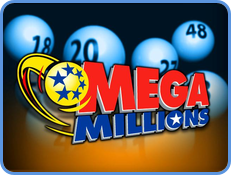
|
Many countries legalized the lottery games in late 1900s and with the help of internet infrastructure, people from different parts of the world now have the opportunities to play lottery games online
Now you can find an array of websites offering online lotteries, including reputable lottery tickets agents like theLotter.
Best Games Directory recommends that you use the services of theLotter and buy lottery tickets online. I wish you good luck and big prizes when playing lottery online.
Best Games Directory recommends that you use the services of theLotter and buy lottery tickets online. I wish you good luck and big prizes when playing lottery online.
